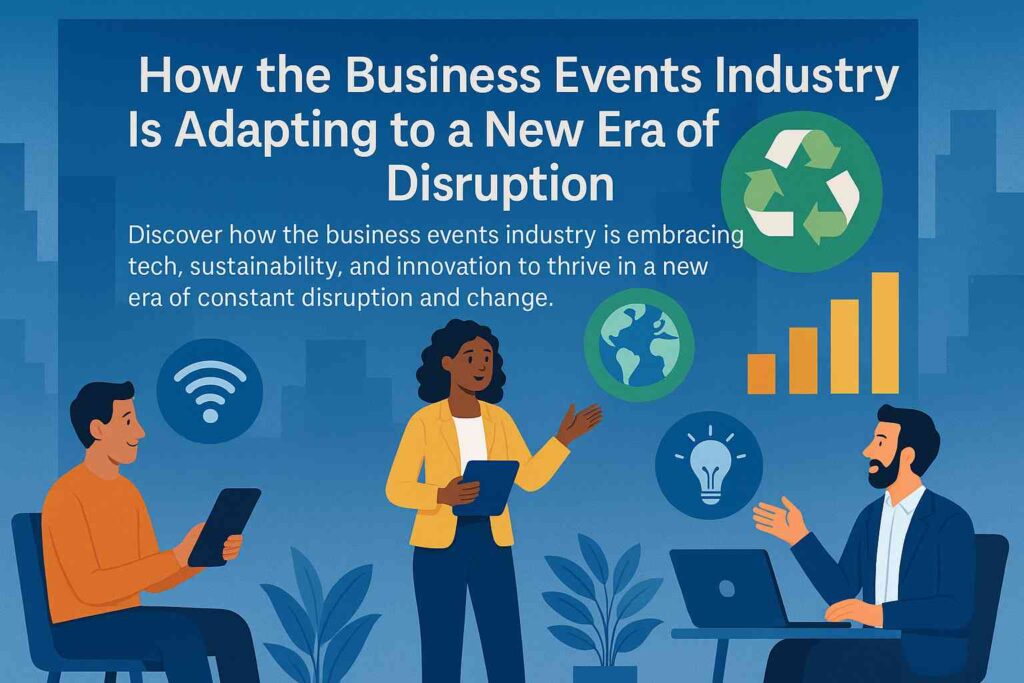The Business Events Industry has never been a stranger to disruption, but over the past few years, the rate, magnitude, and complexity of change have never been higher. Global health crises, economic turmoil, digital transformation, and evolving stakeholder expectations are just a few of the challenges that the sector is experiencing during this new era of agility, innovation, and resilience.
However, with this unpredictability, the industry is not only surviving, but it is transforming itself. A mix of trends in the event industry, research, foresight thinking, and innovation through collaboration, business events are becoming more sustainable, inclusive, and technologically-focused.
What is the new era of disruption in the business events industry
The new era of disruption in the business events industry is defined by rapid, unpredictable change driven by technology, global crises, shifting audience behaviours, and sustainability demands.
Hybrid and virtual formats have redefined how events are delivered. AI is reshaping event planning, personalisation, and networking. Meanwhile, climate change and social responsibility are pushing organisers to adopt sustainable practices. Add to this a digitally native audience that expects seamless, inclusive, and immersive experiences—traditional models no longer cut it.
In short, the industry is facing a transformation where agility, innovation, and resilience are no longer optional—they’re survival tools.
- Digital Transformation: The Quick Fix to the Core Strategy
During the peak of the pandemic, digital tools were used as temporary measures. However, they are the backbone of a novel hybrid-first reality nowadays. Virtual platforms, AI-powered matchmaking, immersive technologies, and mobile-first delegate experiences are not optional anymore; they are expected.
These technologies are now being used by organisers to not only increase the engagement but also to increase accessibility and the lifecycle of the event beyond physical locations.
The current Event Industry Trends and Research indicate that effective business events will now include virtual components even in completely in-person formats, providing on-demand content, live-streamed sessions, and virtual networking to international audiences.
- Data-Driven Decision Making
Information has turned out to be the spine of intelligent planning. Prior to an event, interest tracking data informs organisers on how to create relevant, personalised, and profitable event experiences, and after the event, engagement analytics data informs organisers on how to create relevant, personalised, and profitable event experiences.
This development is one of the broader trends to intelligence-led strategy. As the most prominent industry trends and studies indicate, data not only enhances event ROI but can also be used to predict the needs of attendees, assess sustainability indicators, and optimise future products.
Events that have in-built analytics, behavioural tracking and CRM integration are assisting event professionals in making quicker, smarter decisions – and more importantly, proving tangible results to stakeholders and sponsors.
- Strategic Imperative Sustainability
With increasing pressure on environmental responsibility in the world, the Business Events Industry is being forced to reduce its footprint. However, it is not merely about checking ESG boxes, and a lot of organisations are integrating sustainability into their brand identity and operational DNA.
Carbon offsetting, eco-friendly materials, local sourcing, digital solutions to print, and waste reduction are becoming the new norm in sustainable event management. However, sustainability does not just entail the environment, but also social and economic equity.
Organisers of events are selecting destinations that focus on sustainability, matching the venues that provide green certification and creating partnerships with like-minded suppliers. This deliberate transition assists in creating reputational value and long-term trust among audiences that are ever more values-oriented.
- Redesigning the Value Proposition to the Attendees and Stakeholders
Modern audiences are not satisfied with mere information, but they want to feel connected, find a sense, and self-improve. This has caused a reconsideration of the meaning of value in business events.
Curated experiences, experiential learning, wellness areas, DEI programming, and the chance to make meaningful connections are gaining prominence. The Business Events Industry is shifting towards transformational experience in contrast to transactional encounter.
This also implies that sponsors and stakeholders will have to reconsider the criteria of success. Older KPIs such as the number of attendees are being replaced by the metrics of audience engagement, lead quality and brand alignment.
- Localisation and Integration into the Community
In geopolitically uncertain times, when travel is becoming more expensive, localisation is becoming an effective response strategy. In a bid to reduce risk and increase relevance to the local population, more organisers are turning to regional hubs or decentralised events.
There are also more purposeful ways that events are becoming part of host communities, such as sustainable event management. Shared value and stronger connections are built through cultural programming, local business participation and legacy projects.
The industry makes sure that the destination does not just leave an economic trail, but also a positive social trace with the events embedded into the fabric of the destination.
- Collaborative Resilience, the New Business Model
The emergence of collaboration is one of the strongest changes in the post-disruption world. Venues, CVBs, associations, tech providers and planners are building more robust ecosystems to share experience, minimise overlap, and co-design more versatile models.
The overall reaction to disruption has indicated that complexity cannot be handled by an individual player. The industry is becoming resilient and future-ready with the help of cross-sector alliances, knowledge-sharing platforms, and co-investment models.
Conclusion
The Business Events Industry is at a crossroads. The disruption is not a one-time shock anymore, but a continuous variable and with it, there is a chance of reinvention.
The industry is not only surviving but it is thriving by embracing technology, focusing on sustainability, redefining stakeholder value and collaborative innovation. And as the current Event Industry Trends and Research continue to indicate that even greater change is coming in the future, one thing remains certain: the future will be owned by those brave enough to change with it.
- How the Business Events Industry Is Adapting to a New Era of Disruption
- Discover how the business events industry is embracing tech, sustainability, and innovation to thrive in a new era of constant disruption and change.
- Business Events Industry, Event Industry Trends and Researc, , Sustainable Event Management
Related posts:
 Discover the Best Fence Installation Services in Omaha with Huskins Services LLC
Discover the Best Fence Installation Services in Omaha with Huskins Services LLC
 Summer Solstice Party Ideas & Activities for a Magical Celebration | BizzCrave
Summer Solstice Party Ideas & Activities for a Magical Celebration | BizzCrave
 At the Time of Booking: What to Keep in Mind During a Medical Emergency
At the Time of Booking: What to Keep in Mind During a Medical Emergency
 Streamline Your Business with an Automated Employee Payroll System
Streamline Your Business with an Automated Employee Payroll System
 Nutrition and Wellness Programs in Assisted Living Communities in Oakville
Nutrition and Wellness Programs in Assisted Living Communities in Oakville
 How UAE Fitout Experts Are Elevating Luxury Brand Spaces in 2025
How UAE Fitout Experts Are Elevating Luxury Brand Spaces in 2025
 Lightning-Quick Printing: Same Day Custom Long Sleeve Shirt Printing London
Lightning-Quick Printing: Same Day Custom Long Sleeve Shirt Printing London
 Boca Raton Auto Insurance: Online Quotes from Leading Providers
Boca Raton Auto Insurance: Online Quotes from Leading Providers





